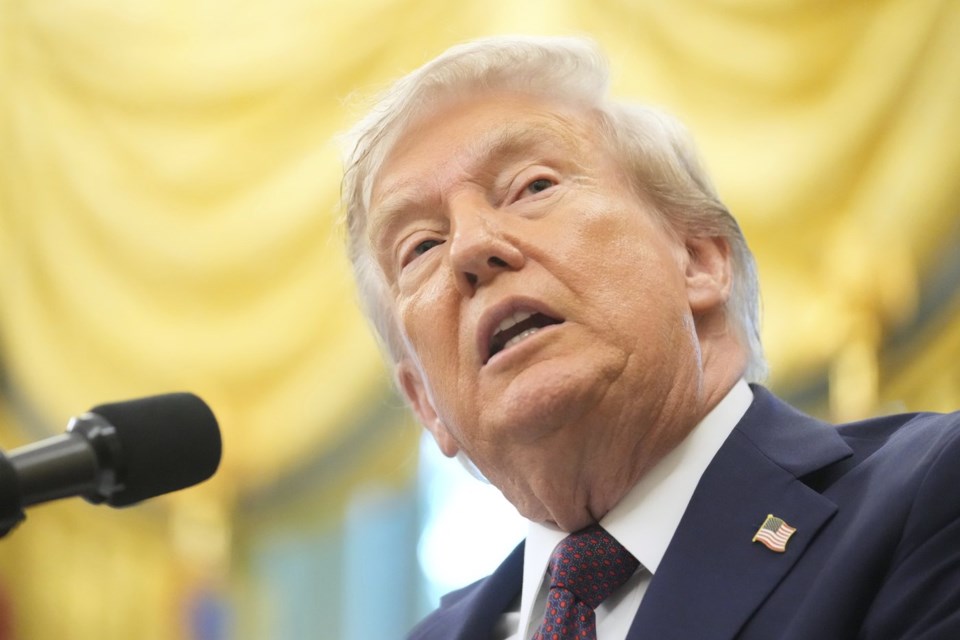WASHINGTON — U.S. President Donald Trump indicated Tuesday that he'll appeal to the United States Supreme Court as early as Wednesday in an effort to overturn a ruling that found many of his tariffs illegal and cast doubt on his plans to realign global trade.
"If you took away tariffs, we could end up being a Third World country," Trump told reporters in the Oval Office. "So we're asking for an expedited ruling."
Last Friday, the United States Court of Appeals for the Federal Circuit found that Trump's "Liberation Day" tariffs and his fentanyl-related duties exceeded his powers under the national security statute he used to impose them.
Trump used the International Economic Emergency Powers Act of 1977, usually referred to by the acronym IEEPA, to hit much of the world with duties, even though the statute does not include the word "tariff" or its synonyms.
The appeals court left the tariffs in place until Oct. 14 so the Trump administration could take the case to the Supreme Court.
"We're going to be going to the Supreme Court, we think, tomorrow because we need an early decision," Trump said.
The president responded furiously to Friday's decision, calling it a "Liberal court" and saying the people behind the lawsuit are from "foreign countries."
The hearing combined two cases. One involves five American small businesses arguing specifically against Trump's worldwide tariffs, and the other came from 12 states pushing back on both the "Liberation Day" duties and the fentanyl-related tariffs.
Trump claimed that without the tariffs, "this country is in serious serious trouble" and blamed Tuesday's drop in financial markets on instability caused by the ruling.
IEEPA is a national security statute that gives the U.S. president authority to control economic transactions after declaring a national emergency.
No president had ever used it for tariffs before Trump declared fentanyl-related emergencies at the borders to slam Canada, Mexico and China with economywide duties. Those tariffs do not hit goods compliant under the Canada-U.S.-Mexico Agreement on trade, called CUSMA.
Trump took his trade war to the world in April with duties on nearly every country, saying America's trade deficits amounted to a national emergency.
Some of America's trading partners made agreements with the Trump administration — including the United Kingdom, Japan, Vietnam, Indonesia and the European Union — but steep tariffs remain in place.
An agreement with Canada never materialized and Trump increased tariffs on Canada to 35 per cent at the start of August, citing fentanyl and retaliatory tariffs as justification for the increase.
U.S. government data shows a tiny volume of fentanyl is seized at the northern border.
Prime Minister Mark Carney has cautioned that it's not likely Canada will be spared completely from Trump's tariffs.
Much of the cross-border trade is currently shielded by CUSMA but many Canadian industries are being hammered by Trump's separate sectoral tariffs on steel, aluminum, copper and automobiles. Canadian officials are also concerned about looming sectoral tariffs on lumber.
Even if the Supreme Court rules against Trump's IEEPA tariffs, those damaging duties could remain in place because Trump used different powers under Section 232 of the Trade Expansion Act of 1962 to enact those levies.
Canada-U.S. Trade Minister Dominic LeBlanc met with U.S. Commerce Secretary Howard Lutnick in Washington last week and said progress was made on a new economic and security agreement between the two countries. Canadian officials are looking for a way to ease the pressures from Trump's sectoral tariffs.
Trump on Tuesday repeated his claim that "Canada called" about his "Golden Dome" plan for a missile defence shield. Trump has said both that Canada would have to pay $61 billion and $71 billion to join.
"Canada wants very much to be included in that," the president said as he announced that the U.S. Space Command will be moved from Colorado to Alabama. "And we are going to work something out with them, I hope."
This report by The Canadian Press was first published Sept. 2, 2025.
Kelly Geraldine Malone, The Canadian Press



